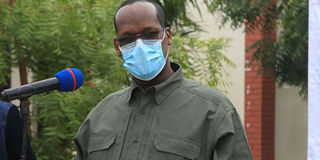Kenyans sneak into Somalia for prayers as mosques opened

Mandera Governor Ali Roba - on April 22, 2020 - expresses his support for the government's efforts in curbing the spread of coronavirus. PHOTO | FILE | NATION MEDIA GROUP
What you need to know:
- Kenya shares a long porous border with Somalia, making it difficult for security teams and disease surveillance teams to track all new entrants.
- Garissa announced the immediate closure of Dagahley livestock market in Dadaab following confirmed reports of the virus in Wajir.
From Saudi Arabia, United Kingdom, Palestine and many other parts of the world including Kenya, mosques are unusually quiet as calls to evening prayers reverberate across the streets, urging worshippers to pray at their homes.
But as places of worship remain closed due to the coronavirus pandemic, the situation is different in Somalia as mosques remain open during this holy month of Ramadhan.
The country, which has 671 confirmed Covid-19 cases and 31 deaths, is yet to close its mosques, where large gatherings are witnessed during prayers.
The Nation has now established that Kenyans in Mandera are sneaking into Somalia to perform Taraweeh — nightly prayers.
Government officials are also looking out for the trend in border counties such a Wajir and Garissa.
Wajir has reported two Covid-19 cases, which were imported from Somalia. The two traders, who hail from Garissa, had travelled for a livestock trading trip before they were intercepted by security agencies in Diff, at the Kenya-Somalia border, on their way back to Kenya.
Kenya shares a long porous border with Somalia, making it difficult for security teams and disease surveillance teams to track all new entrants into the region.
DIFF ON LOCKDOWN
Mandera County Commissioner Onesmus Kyatha said those found sneaking out to Somalia for the prayer would be placed under forced quarantine at their own cost and later prosecuted.
“We have information that several residents of Mandera have been crossing into Somalia to perform prayers in mosques there. We have activated our security operation, and anybody found will be arrested and prosecuted after completing a 14-day quarantine,” said Mr Kyatha.
Mr Kyatha said Imams and Sheikhs have to ensure government directives are adhered to.
The recent surge in coronavirus cases in the neighbouring Somalia and the high number of community transmissions has put Wajir, Mandera and Garissa counties at high risk of importing the virus.
This has put State agencies on alert. In Wajir, Governor Mohamed Abdi dispatched a team of health personnel to Diff, Dadajabula and other towns to screen residents and fumigate public places.
Mr Abdi also ordered the lockdown of Diff town for 14 days starting May 3.
MARKET CLOSED
The governor also suspended outpatient services at Wajir Referral Hospital until further notice; the facility now serves as the main isolation centre.
The county administration also ordered the closure of Diff and Dagahaley livestock markets.
On Sunday, Garissa County government announced the immediate closure of Dagahley livestock market in Dadaab following confirmed reports of the virus in Wajir.
"The closure is informed by the risk level of the market since traders are known to move across the border to Somalia to get stock," Health Executive Ahmednadir Omar Sheikh said.
In Mandera, Governor Ali Roba is also implementing a number of measures to curb the spread of the virus.
They include a total lockdown to prevent entry and exit of people and vehicles from the county, hiring hotels for frontline health workers treating Covid-19 cases and temporary suspension of miraa trade, which has since been lifted.
Reported by Bruhan Makong, Manase Otsialo, Nasibo Kabale and Jacob Walter

